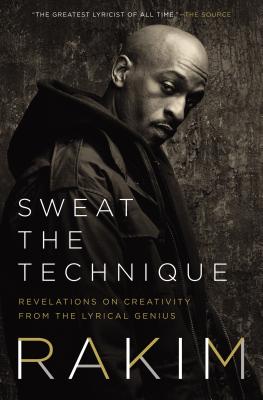
Sweat the Technique
Revelations on Creativity from the Lyrical Genius
کتاب های مرتبط
- اطلاعات
- نقد و بررسی
- دیدگاه کاربران
نقد و بررسی

February 1, 2019
One of hip-hop's greats, Rakim discusses growing up on Long Island in a music-loving community, rising to the top in the New York clubs and Los Angeles studios, and imbibing the influence of John Coltrane and the spiritual sensibility of the streets. But he delivers more than a memoir. With the help of esteemed music journalist and cultural critic Toure, he examines the craft of writing--and not just music. This exploration of language is meant for anyone. With a 100,000-copy first printing.
Copyright 2019 Library Journal, LLC Used with permission.

Reflections on a life of artistic commitment during hip-hop's golden age. "I wasn't trying to become a rapper, I just enjoyed doing it," writes Rakim in his debut memoir. From his first exposure to hip-hop as a boy to being universally recognized as a contender for the greatest MC of all time, Rakim makes his love of rap manifest throughout the book. Whether rapping "from 10 in the morning to midnight, every day," or refusing to change his style to meet the approval of Marley Marl or Dr. Dre, he presents himself as deeply committed to the art of rap. His experience crafting lyrics transfers nicely to prose; the narrative is reflective in the way of good memoir and revelatory in the way of good reportage. The scenes from Rakim's childhood are especially vivid and establish him early on as the smart and fiercely independent person his fans would come to know through his music. One consequence of that independence has been the number of people he has been at odds with over the course of his career. Ever the competitor, Rakim uses the book as a chance to settle scores with seemingly every rapper of his era other than Tupac, for whom he has only respect. About his longtime collaborator Eric B., he writes, "I'm really hip-hop and Eric really wasn't....I think deep down, Eric wanted to be an R&B singer." The book wavers when the author turns didactic or lets sections of lyrics and commentary interrupt the narrative. Readers gain so much from Rakim's story and his insights into artistry that the moments of didacticism--e.g., "if it's your first tour, be prepared for the unique variety of challenges that come with being a rap artist"--become grating. The author's lyrics, as groundbreaking as they were, don't read as well as they sound in Rakim's voice, nor do they add to what the book otherwise does so well: tell the personal story of one of hip-hop's greatest icons. Not without flaws but an insightful firsthand account of hip-hop's vanguard.
COPYRIGHT(2019) Kirkus Reviews, ALL RIGHTS RESERVED. (Online Review)

September 15, 2019
Lyricist and rapper supreme Rakim regales readers with creative insights in a mix of memoir and how-to, both emphasizing how to find and marshal inspiration. Sharing verses from his favorite singles, he shows how he became such a success, assembling an arsenal of words and performance strategies and drawing ideas and energy from the world around him, along with the work of such key figures as John Coltrane, James Brown, and Jesse Jackson. Chief among his suggestions is sticking to one's guns while maintaining openness to new concepts. While pertinent not only to rappers but to all creatives, Rakim's disclosures also speak to uniquely Black concerns. Readers will appreciate his depiction of Black families building each other up, as, for example, how his father helped him to achieve fluency and resourcefulness. Die-hard rap fans will appreciate the historic detail as Rakim places his upbringing and trajectory as a recording artist within the larger context of 1980s and '90s social upheaval. This joins the best of rap history and criticism and has the potential to inspire a new age of rap lyricism.(Reprinted with permission of Booklist, copyright 2019, American Library Association.)

























دیدگاه کاربران